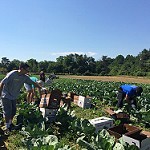Event Details
Date
January 10, 2017
Time
5-8 pm
Location
CCE Oneida County
121 Second Street
Oriskany, NY 13424
Cost
$25.00 Per Class
(additional attendee $25.00 ea.)
$60.00 For all 4 sessions (1 x per month Nov - Feb)
(additional attendee $60.00 ea.)
Host
CCE Oneida County
Bonnie Collins
(315) 736-3394
email Bonnie Collins
CCE Oneida County
EVENT HAS PASSED
What is my job? Hiring, training and evaluating employees effectively
January 10, 2017
How well do your employees understand their jobs?
Everyone wants farm employees who know what to do without being told. Unfortunately most people you hire or manage can't read minds. This workshop will help you develop effective tools for training and evaluating new employees or employees moving into new positions. You will learn to develop clear job descriptions, learn techniques in hiring, and training new staff and how to use "just in time" feedback and performance appraisal to both correct problems and motivate your staff.
Your employees are your most valuable resource. Wages, salaries, and contract labor expenses represent more than 40 percent of the cost of production in labor intensive crops like fruits, vegetables, and nursery products. Can you afford to not improve your skills in managing employees effectively?
This is the second of four workshops on Human Resource Management on the Farm. Sign up for the full series of workshops in Oriskany, NY at a discounted price.
- November 29 - Marketing your farm as a great place to work
- January 24 - Keeping good staff when money is tight & managing conflict in the workplace
- February 7 - The compliance and safety workshop. Are you managing your risks as an employer?



































